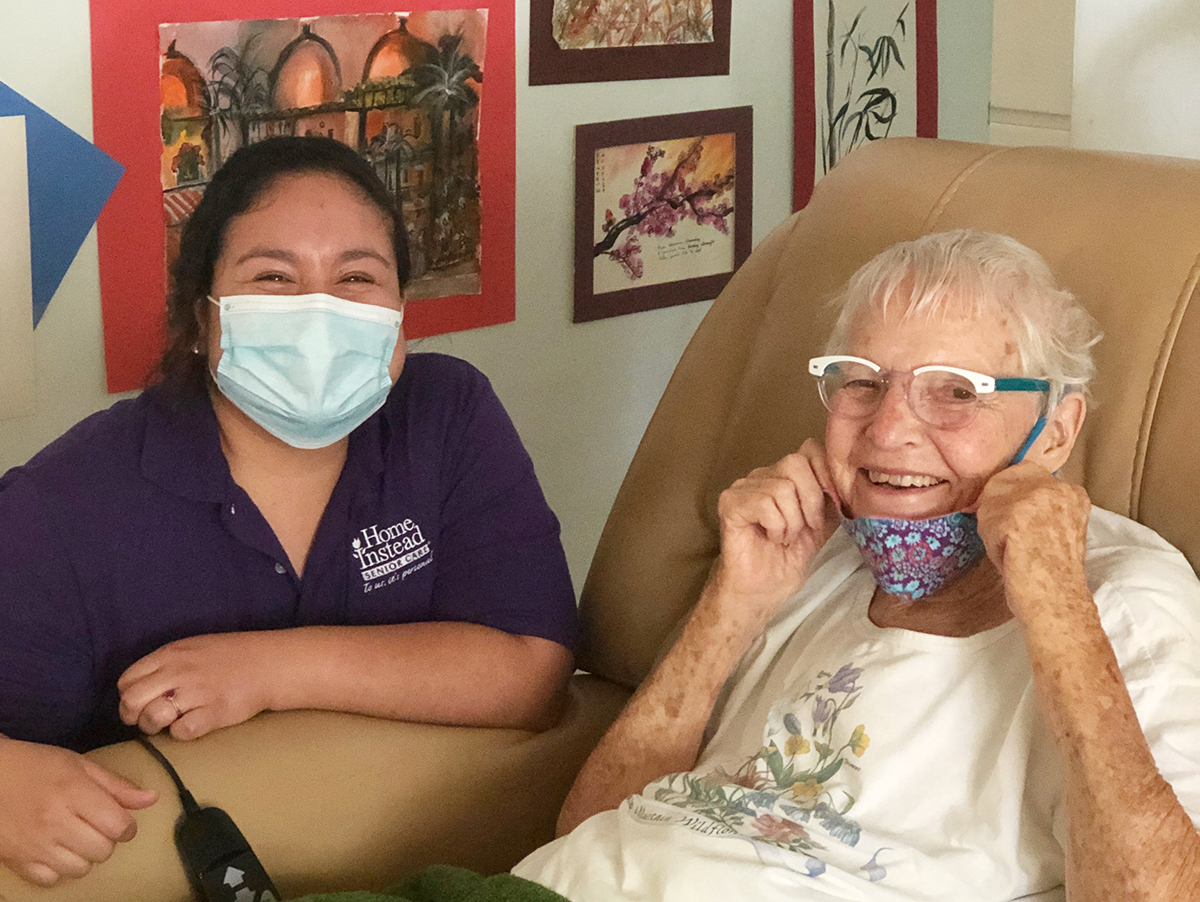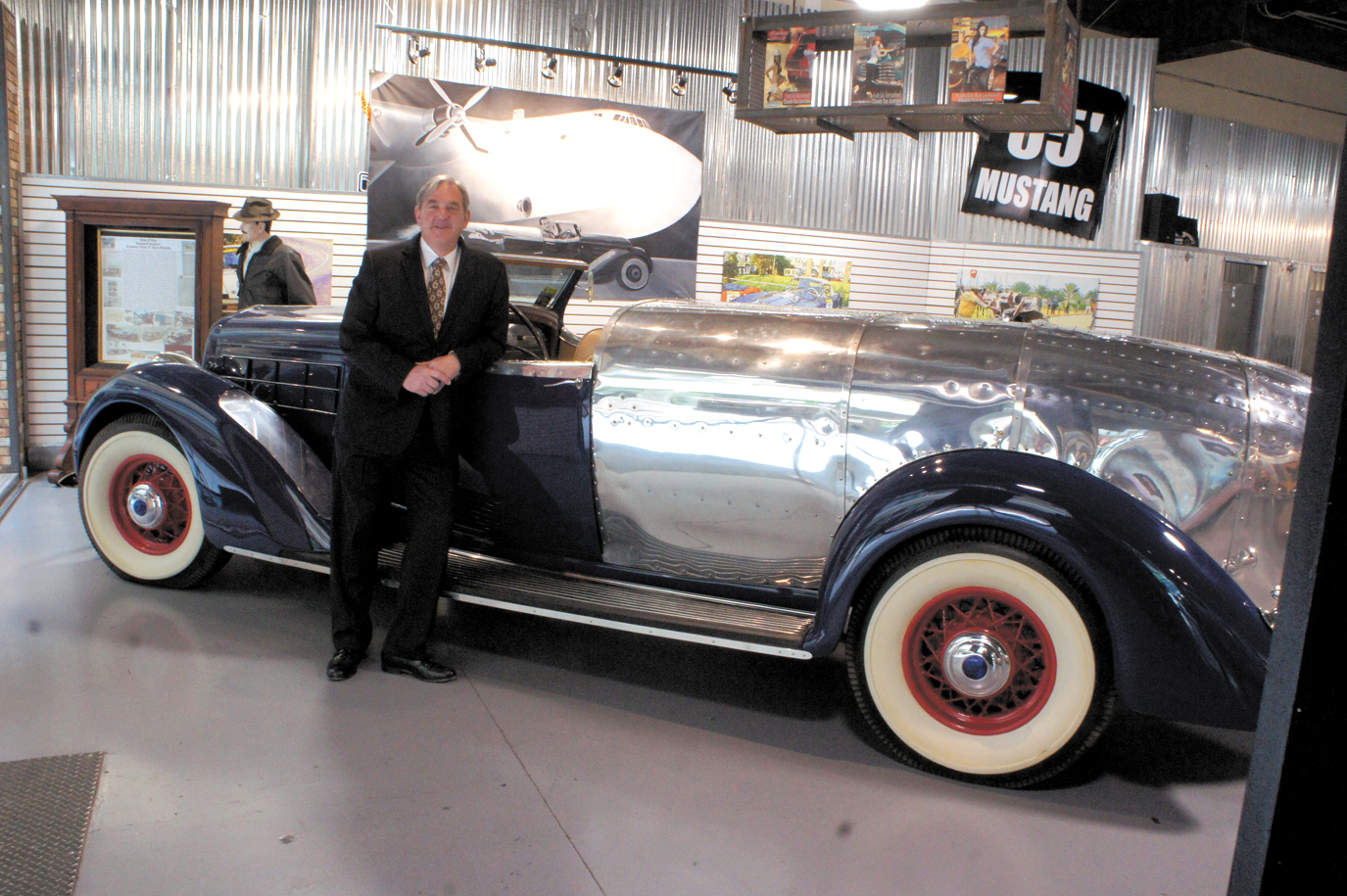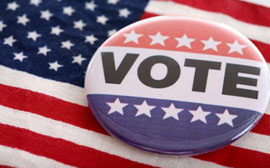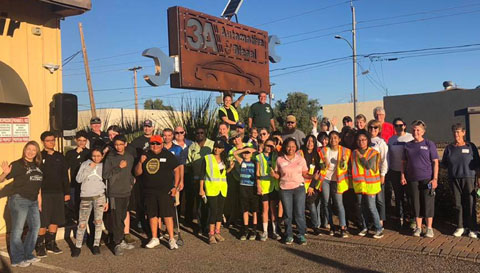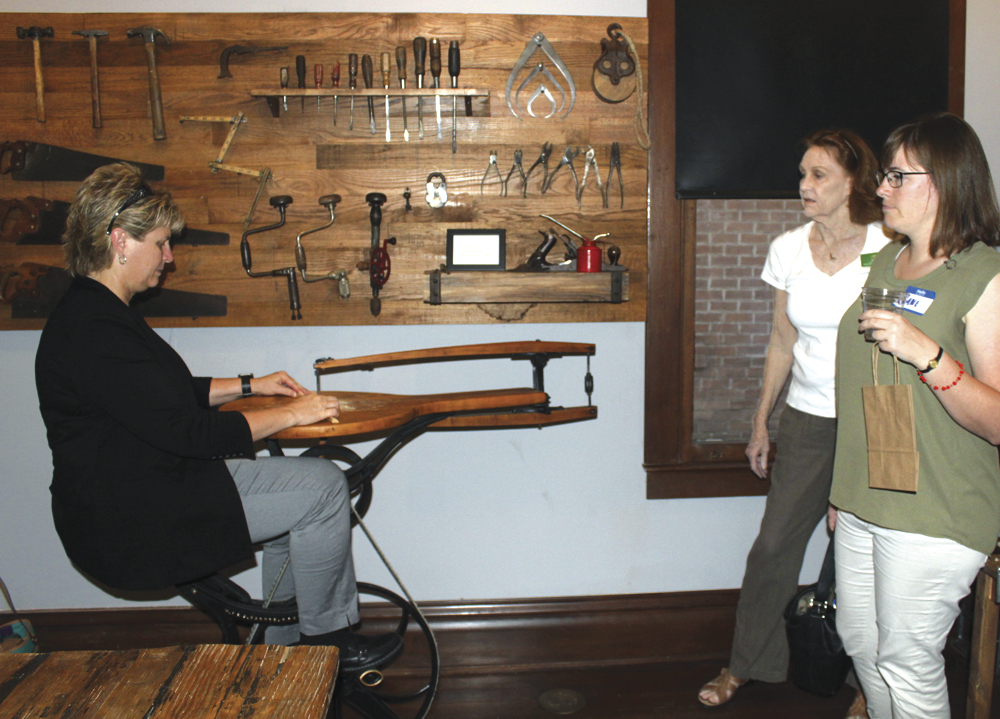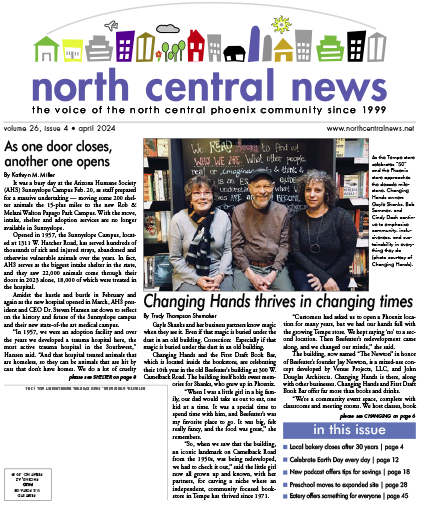Non-profit organizations and senior living communities are scrambling to keep senior citizens fed, physically healthy and socially connected during this Coronavirus pandemic.
AARP Arizona has been urging governmental leaders to provide more oversight in long-term care facilities, as well as to ensure access to personal protective equipment and testing for COVID-19 in these communities and to offer technology for virtual visitation so older residents can socialize safely with loved ones. The Area Agency on Aging for Maricopa County has been answering thousands of calls from seniors to its help line, responding by delivering food, cleaning supplies, toiletries and emotional reassurance. Senior living communities have found creative ways to keep residents entertained, physically active and connected by offering video/online classes and socially distanced activities on their campuses.
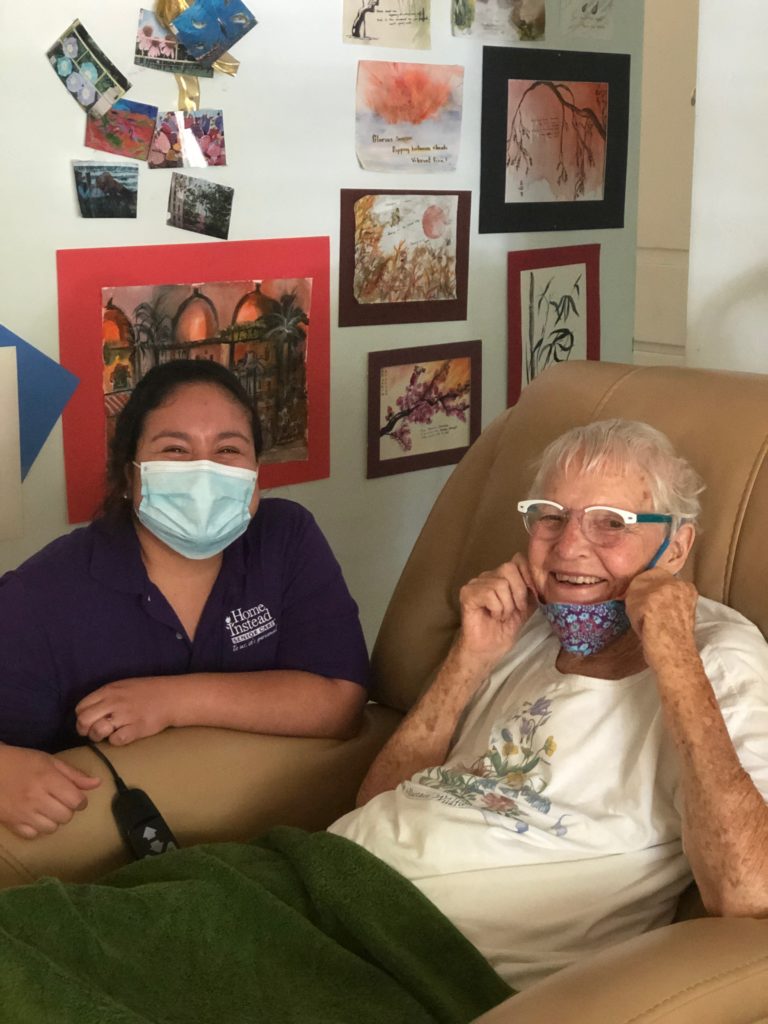
Ruby Estrada, a caregiver with Home Instead Senior Care, bonds with client Mary Large, who recently celebrated her 99th birthday. Large and other seniors rely on Home Instead Senior Care employees to help keep them safe and healthy at home (photo courtesy of Home Instead Senior Care).
Experts say social isolation is a big issue during these times when outside visitors are limited because of the risk of spreading the virus. Elderly residents are especially vulnerable to contracting COVID-19, meaning many have not been able to see family members in-person for several months.
“I would say it’s tough for everybody right now,” said Mark Aronauer, marketing director at The Palazzo. “They’re going stir crazy. There’s a sadness and remorseful feeling that they haven’t seen family members in so long.”
The Palazzo, which has about 350 residents, provides independent living, assisted living, skilled nursing and memory care housing at 6250 N. 19th Ave. Residents ordinarily can engage in many classes, services and other gatherings but it has had to reduce many offerings to try to keep people safe. The community closed its doors to most outside visitors as soon as the COVID-19 outbreak began in March.
Family members of The Palazzo residents can come for visits with limits. Recently The Palazzo worked with the Phoenix Fire Department to coordinate a man getting a ride in a fire truck, which lifted him up to the level of his mother’s upstairs apartment to surprise her for her 100th birthday. A birthday party was held for a resident whose family was able to hug her through a “hug wall,” which allows people to touch through plastic for their protection.
The Palazzo has added socially distant Bingo games and provides yoga and other exercise classes, as well as lectures, seminars, museum virtual tours and other activities that residents can access on their TVs. Staff members help residents communicate with loved ones via Skype on laptops, phones and iPads.
The Terraces of Phoenix, which has independent, assisted living, skilled nursing and memory care at 7550 N. 16th St., also is trying to keep seniors connected.
“The magic of this community is our community, that connectiveness,” said Jaime Roberts, executive director of The Terraces of Phoenix. “We’re really balancing public health with emotional health. We miss the families.”
The Terraces has provided yoga, meditation and other fitness classes through its in-house TV system that residents can watch in their apartments. Staff members organized a traveling block party inside each building, where people could sit in the hallway to watch a group singing from a social distance. Writing classes, a men’s Bible group and other activities are provided through Zoom and The Terraces even held a hallway karaoke event.
Home Instead Senior Care offers caregiving services for older residents to allow them to live in their own homes. Its employees help with medication and meal management, bathing and dressing clients, taking them to medical appointments and grocery stores, as well as offering companionship, among other assistance. They helped about 200 seniors from March to late June out of the Home Instead office based at 1430 E. Missouri Ave., said Kelly Cornelius, owner of that Home Instead Senior Care.
“We’ve been extremely busy and we’re getting calls from families, who really more than ever want to keep their seniors at home,” Cornelius said.
Some Home Instead employees recently brought an ice cream cake to Mary Large, who celebrated her 99th birthday. Large was thrilled by the celebration and said she could not survive without the support of the Home Instead team.
“They give me a bath and take care of the necessary things that need to be taken care of and then whatever comes along they will do it!” Large said.
Many Home Instead clients miss their children and the company aims to try to alleviate that “loneliness and isolation” that can lead to depression, Cornelius said. The employees help coordinate clients’ video chats with family members.
Dana Kennedy, state director of AARP Arizona, has been advocating for seniors in letters to Gov. Doug Ducey and other state officials, as well as online before the U.S. House Ways and Means Subcommittee on Health. She sent a letter in June to Ducey asking him to use federal funding to place more inspectors in long-term care facilities and to consider providing money to address COVID-19 in nursing homes, as well as in assisted living centers and other long-term care facilities. The money could be used for personal protective equipment, testing for COVID-19, staffing, disinfection, telemedicine, technology for communication and for facilitating virtual visits between residents and their family members.
Kennedy praised Ducey for deciding to fund $10 million for personal protective equipment and testing for residents and staff members of long-term care facilities. She said the state ombudsman employees would be allowed to go back into these centers. The Long-Term Care Ombudsman Program identifies, investigates and resolves complaints that are made by or on behalf of residents of nursing homes, assisted living facilities and adult foster care homes.
Kennedy said progress is being made at the state level to help elderly residents but more work needs to be done. She wrote a letter to Ducey, as well as Dr. Cara Christ, director of the Arizona Department of Health Services and Jami Snyder, director of the Arizona Health Care Cost Containment System (AHCCCS) recently expressing concerns about the Arizona Crisis Standards of Care Plan. This plan provides guidance related to triage for emergency medical services, among other healthcare delivery measures. Kennedy said AARP Arizona appreciates the general language in the plan directing healthcare in a crisis to be offered in a non-discriminatory way but it has not addressed some important topics.
She said the plan said “resources including ventilators, oxygen delivery devices, and medications should be allocated to patients whose need is greater or whose prognoses is more likely to result in a positive outcome.” Kennedy said that the criteria could “severely disadvantage” at-risk people and especially older adults, as well as those with disabilities and residents of color.
“If somebody does need to go into the hospital and hospitals are filled to capacity, doctors are in a position to determine if someone gets care,” she said. “It’s basically age discrimination and also people with disabilities and chronic conditions may be discriminated against.”
Area Agency on Aging for Maricopa County has responded to an unprecedented number of requests for help through its Senior Help Line. From March 18 to about April 16 it had received more than 15,500 calls to this 24-hour information and referral hotline, which is more than three times the number of calls received during the previous four weeks.
Mary Lynn Kasunic, president and CEO of Area Agency on Aging for Maricopa County, said the organization provided nearly 2,500 food boxes and bags to seniors from March 18 to July 1.
“They’re extremely isolated,” Kasunic said. “We’re trying to reach out to them and see if we can make them feel maybe a little more connected.”
The Area Agency on Aging for Maricopa County provides programs and services for people ages 60 and older, as well as to residents ages 18 and older with disabilities and long-term care needs and family caregivers. Seniors can call the 24-hour Senior Help Line at 602-264-HELP (4357). To learn more about Area Agency on Aging for Maricopa County, visit aaaphx.org.

